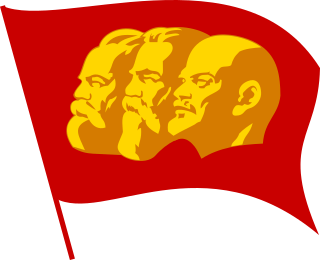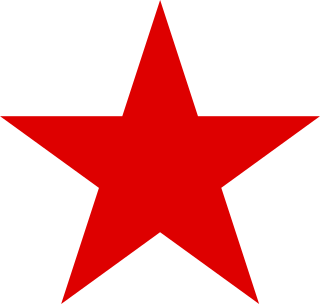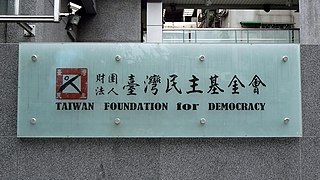
Anarcho-communism is a political philosophy and anarchist school of thought which advocates the abolition of the state, capitalism, wage labour and private property in favor of common ownership of the means of production, direct democracy, cooperativism, equal distribution of valuables, and a horizontal network of workers' councils with production and consumption based on the guiding principle: "From each according to his ability, to each according to his needs".

In political science, Marxism–Leninism was the official state ideology of the Soviet Union (USSR), of the parties of the Communist International, after their Bolshevisation, and is the ideology of Stalinist political parties. As Stalin's synthesis of Leninism, the political praxis of Lenin, and of Marxism, the politico-economic theories of Karl Marx, the purpose of Marxism–Leninism is the transformation of a capitalist state into a socialist state, by way of two-stage revolution, guided and led by a vanguard party of professional revolutionaries, drawn from the proletariat. To realise the two-stage transformation of the state, the vanguard party establishes the dictatorship of the proletariat, which determines policy with democratic centralism.

Alexander Dubček was a Slovak politician who served as the First secretary of the Presidium of the Central Committee of the Communist Party of Czechoslovakia (KSČ) from January 1968 to April 1969. He attempted to reform the communist government during the Prague Spring but was forced to resign following the Warsaw Pact invasion in August 1968.

Red-baiting, also reductio ad Stalinum, is an informal logical fallacy that intends to discredit the validity of an opponent's logical argument by accusing, denouncing, attacking, or persecuting an individual or group as communist, socialist, Marxist, Stalinist or anarchist, or sympathetic towards these ideologies. In the United States, the term "red-baiting" dates from at least 1927. In 1928, black-listing by the Daughters of the American Revolution was characterized as a "red-baiting relic". It is a term commonly used in the United States, and in United States history, red-baiting is most often associated with McCarthyism, which originated in the two historic Red Scare periods of the 1920s and 1950s. In the 21st century, red-baiting does not have quite the same effect it previously did due to the fall of Soviet-style Communism, but some pundits have argued that notable events in current American politics indicate a resurgence of red-baiting consistent with the 1950s.

Christian communism is a form of religious communism based on Christianity. It is a theological and political theory based upon the view that the teachings of Jesus Christ compel Christians to support communism as the ideal social system. Although there is no universal agreement on the exact date when Christian communism was founded, many Christian communists assert that evidence from the Bible suggests that the first Christians, including the apostles, established their own small communist society in the years following Jesus' death and resurrection. As such, many advocates of Christian communism argue that it was taught by Jesus and practiced by the apostles themselves. Some independent historians confirm it.

The Communist Party USA, officially the Communist Party of the United States of America (CPUSA), is a communist party in the United States established in 1919 after a split in the Socialist Party of America.

Stéphane Courtois is a French historian and university professor, a Director of research at the French National Centre for Scientific Research (CNRS), Professor at the Catholic Institute of Higher Studies (ICES) in La Roche-sur-Yon, and Director of a collection specialized in the history of communist movements and regimes.

The history of communism encompasses a wide variety of ideologies and political movements sharing the core theoretical values of common ownership of wealth, economic enterprise and property.

The Victims of Communism Memorial is a memorial in Washington, D.C. located at the intersection of Massachusetts and New Jersey Avenues and G Street, NW, two blocks from Union Station and within view of the U.S. Capitol.

Communization mainly refers to a contemporary communist theory in which there is a "mixing-up of insurrectionist anarchism, the communist ultra-left, post-autonomists, anti-political currents, groups like the Invisible Committee, as well as more explicitly ‘communizing’ currents, such as Théorie Communiste. "Obviously at the heart of the word is communism and, as the shift to communization suggests, communism as a particular activity and process..." It is important to note the big differences in perception and usage. Some groups start out from an activist voluntarism, while others derive communization as an historical and social result emerging out of capital's development over the last decades. Endnotes totally distinguishes itself from the mixing of all sorts of meanings of the word communization and explicitly refers to the different reception in the Anglophone world as opposed to the original French milieu from which it emerged as a critique.

In political and social sciences, communism is the philosophical, social, political, and economic ideology and movement whose ultimate goal is the establishment of the communist society, which is a socioeconomic order structured upon the common ownership of the means of production and the absence of social classes, money, and the state.

The fall of Communism in Albania, the last such event in Europe outside the USSR, started in earnest on December 1990 with student demonstrations in the capital, Tirana, although protests had begun earlier that year in other cities. The Central Committee of the communist Party of Labour of Albania allowed political pluralism on 11 December and the largest opposition party, the Democratic Party, was founded the next day. March 1991 elections left the Party of Labour in power, but a general strike and urban opposition led to the formation of a "stability government" that included non-communists. Albania's former communists were routed in elections in March 1992 amid economic collapse and social unrest, with the Democratic Party winning most seats and its party head, Sali Berisha, becoming president.
Far-left politics are political views located further on the left of the left-right spectrum than the standard political left.

Anti-communism is opposition to communism. Organized anti-communism developed after the 1917 October Revolution in Russia and it reached global dimensions during the Cold War, when the United States and the Soviet Union engaged in an intense rivalry. Anti-communism has been an element of movements holding many different political positions, including nationalist, social democratic, liberal, libertarian, conservative, fascist, capitalist, anarchist and even socialist viewpoints.

Several Mass killings occurred under 20th-century Communist regimes. Death estimates vary widely, depending on the definitions of deaths included. The higher estimates of mass killings account for crimes against civilians by governments, including executions, destruction of population through man-made hunger and deaths during forced deportations, imprisonment and through forced labor. Terms used to define these killings include "mass killing", "democide", "politicide", "classicide" and a broad definition of "genocide".
The Victims of Communism Memorial Foundation is a non-profit educational organization in the United States, authorized by a unanimous Act of Congress in 1993 for the purpose of educating Americans about the ideology, history and legacy of communism. The foundation was responsible for building the Victims of Communism Memorial in Washington, D.C. It is a member of the Platform of European Memory and Conscience.

The Taiwan Foundation for Democracy is a non-profit organisation headquartered in Taipei. Originally proposed by the Ministry of Foreign Affairs of the Republic of China, the foundation's purpose is to promote democracy around the world. The Foundation was established in June 2003 as a non-partisan, non-profit organization.

In Marxist thought, communist society or the communist system is the type of society and economic system postulated to emerge from technological advances in the productive forces, representing the ultimate goal of the political ideology of communism. A communist society is characterized by common ownership of the means of production with free access to the articles of consumption and is classless and stateless, implying the end of the exploitation of labour.

Primitive communism is a concept originating from Karl Marx and Friedrich Engels who argued that hunter-gatherer societies were traditionally based on egalitarian social relations and common ownership. A primary inspiration for both Marx and Engels were Lewis Henry Morgan's descriptions of "communism in living" as practised by the Iroquois Nation of North America. In Marx's model of socioeconomic structures, societies with primitive communism had no hierarchical social class structures or capital accumulation.

The Spartacus League was a Marxist revolutionary movement organized in Germany during World War I. The League was named after Spartacus, leader of the largest slave rebellion of the Roman Republic. It was founded by Karl Liebknecht, Rosa Luxemburg, Clara Zetkin, and others. The League subsequently renamed itself the Kommunistische Partei Deutschlands (KPD), joining the Comintern in 1919. Its period of greatest activity was during the German Revolution of 1918, when it sought to incite a revolution by circulating the newspaper Spartacus Letters.












